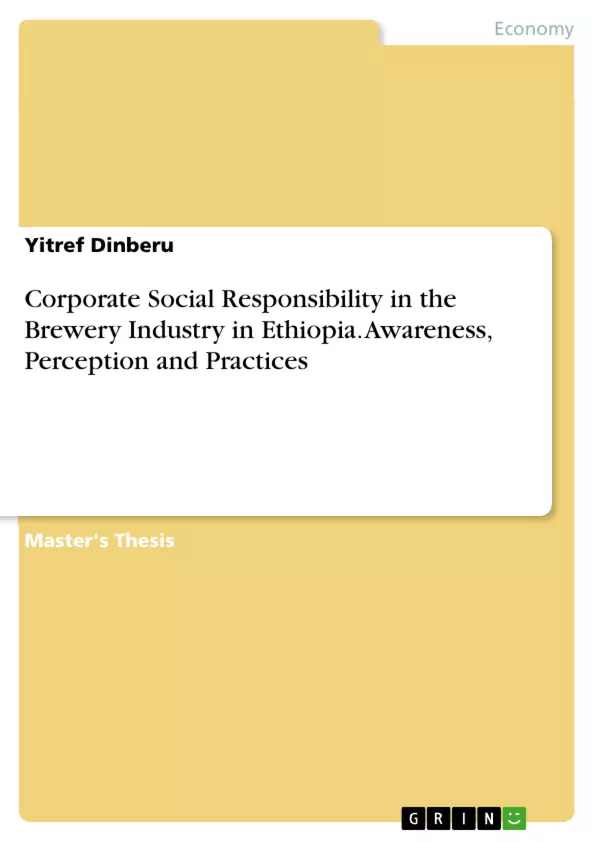The focus of this study is the awareness, perception and practice of Corporate Social Responsibility in the Brewery Industry in Ethiopia.
Therefore, a quantitative study with 203 workers out of the 5835 workers in the industry has been conducted. The results of the study indicate that awareness for Corporate Social Responsibility has a direct positive effect on its actual practice.
Inhaltsverzeichnis (Table of Contents)
- 1. INTRODUCTION
- 1.1 Background of the Study area
- 1.2 Motivation of the study
- 1.3 Statement of the Problem
- 1.4 General Objectives of the study
- 1.5 Specific objectives
- 1.6 Research question
- 1.7 Significance of the study
- 1.8 Scope of the study
- 1.9 Organization of the study
- 2. LITERATURE REVIEWS
- 2.1 The Concept of (CSR) as an organizational phenomenon
- 2.2 Definitions of corporate social responsibility (CSR)
- 2.3 Theoretical CSR conceptualizations
- 2.3.1 Economic responsibility
- 2.3.2 Legal responsibility
- 2.3.3 Ethical responsibility
- 2.3.4 Discretionary/philanthropic responsibility
- 2.3.5 CSR to employees
- 2.4 The Theoretical Literature reviews
- 2.5 Empirical Reviews
- 2.5.1 Stakeholder Theory
- 2.5.2 Organizational stakeholders
- 2.5.3 Business Benefits of Corporate Social Responsibility
- 2.5.4 Why Companies Engaged in CSR
- 2.5.5 Principles of Corporate Social Responsibility
- 2.5.6 Who are the Stakeholders?
- 2.5.7 Stakeholders' Awareness and Understanding of CSR
- 2.5.8 Stakeholders' Perceptions of CSR
- 2.6 Conceptual framework and hypotheses development
- 2.6.1 CSR Awareness and CSR perception
- 2.6.2 Perception OF CSR and CSR Practices
- 2.6.3 CSR Practices
- 2.6.4 Hypothesis
- 2.6.5 Human Rights
- 2.6.6 Labor Practices
- 2.6.7 Environment
- 2.6.8 Fair Operating Practices
- 2.6.9 Consumer Issues
- 2.6.10 Community Involvement and Development
- 3. RESEARCH METHODOLOGY
- 3.1 Research Design
- 3.2 Research Approach
- 3.2.1 Qualitative research
- 3.2.2 Quantitative research
- 3.2.3 Mixed Methods Research
- 3.3 Data Sources
- 3.3.1 Primary data
- 3.3.2 Secondary data
- 3.4 Sampling Technique
- 3.5 Sample Size and determination
- 3.6 Data collection Design
- 3.6.1 Survey Structured Questionnaire
- 3.6.2 Interviews
- 3.6.3 Data analysis techniques
- 3.6.4 Validity and Reliability
- 3.7 Research Model
- 3.8 Ethical Considerations
- 4. DATA PRESENTATION, INTERPRETATION, AND ANALYSIS
- 4.1 Demographic profile of respondents
- 4.2 Descriptive Outcomes
- 4.2.1 Awareness of CSR
- 4.2.1 Stakeholders' Perceptions of CSR
- 4.3.2 CSR Practices
- 4.3 Examining hypothesized relationships
- 4.3.1 Results from mediation analysis
- 4.3.2 Full versus partial mediation
- 4.4 Discussion
- 4.4.1 Discussions on descriptive outcomes
- 4.4.2 Discussion on the hypothesis outcomes
- 5. SUMMARY
- 5.1 Short Summary
- 5.2 Major findings
- 5.2.1 Objective 1
- 5.2.2 Objective 2
- 5.2.3 Objective 3
- 5.2.4 Objective 4
- 5.3 Conclusion
- 5.4 Theoretical implications
- 5.5 Practical implications
- 5.6 Recommendation for future research
- 5.6.1 Limitation and Future direction
Zielsetzung und Themenschwerpunkte (Objectives and Key Themes)
This study explores the awareness, perception, and practices of corporate social responsibility (CSR) within the brewery industry in Ethiopia. The primary objective is to assess the extent to which CSR principles are understood and implemented by businesses in this sector. The study aims to investigate the relationship between CSR awareness, perception, and actual practices, shedding light on the factors that contribute to or hinder the adoption of socially responsible practices.
- Awareness of CSR principles within the Ethiopian brewery industry.
- Perceptions of CSR amongst stakeholders, including employees, consumers, and the community.
- Analysis of actual CSR practices implemented by breweries in Ethiopia.
- Exploring the relationship between CSR awareness, perception, and practices.
- Identifying factors influencing the adoption of CSR initiatives.
Zusammenfassung der Kapitel (Chapter Summaries)
The study begins with an introduction outlining the background, motivation, and objectives of the research. Chapter 2 delves into a comprehensive review of existing literature, covering the concept of CSR, its theoretical conceptualizations, stakeholder theory, and the benefits of CSR for businesses. Chapter 3 outlines the research methodology, including the research design, data sources, sampling techniques, and data analysis methods. Chapter 4 presents the data analysis and interpretation, providing insights into the demographic profile of respondents, awareness of CSR, stakeholder perceptions, and CSR practices within the Ethiopian brewery industry. Chapter 5 summarizes the major findings, drawing conclusions, and providing theoretical and practical implications of the study. The chapter also offers recommendations for future research and discusses limitations of the study.
Schlüsselwörter (Keywords)
This study focuses on corporate social responsibility (CSR), brewery industry, stakeholder engagement, ethical practices, sustainability, environmental impact, social impact, business ethics, stakeholder perceptions, awareness, and practices in Ethiopia. The research aims to contribute to the understanding of CSR adoption in emerging markets and its impact on business performance and community development.
- Arbeit zitieren
- Yitref Dinberu (Autor:in), 2018, Corporate Social Responsibility in the Brewery Industry in Ethiopia. Awareness, Perception and Practices, München, GRIN Verlag, https://www.grin.com/document/454207



